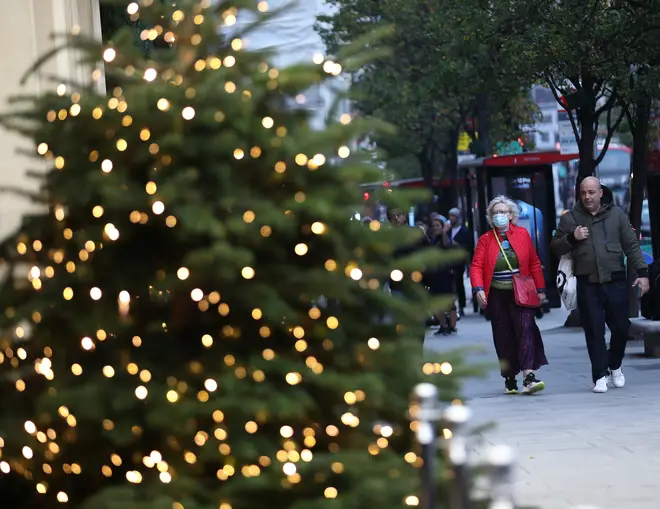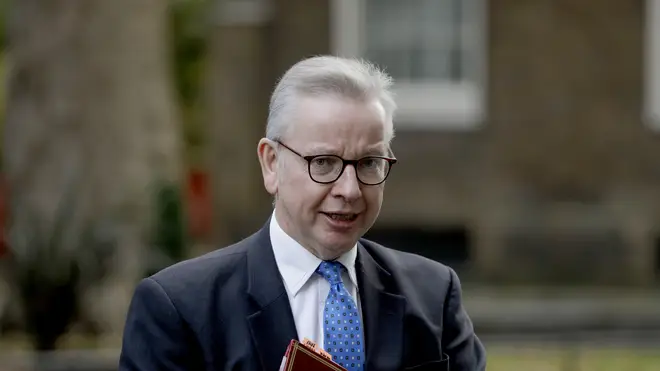
Rachel Johnson 7pm - 10pm
2 November 2020, 10:44 | Updated: 2 November 2020, 12:11

Concerns are growing over the possibility of an extension of England's four-week national lockdown, with some warning ministers could be forced to impose restrictions over Christmas.
Boris Johnson has faced backlash from his own MPs over the new restrictions, which are due to come into force on Thursday.
The Commons will debate the Government’s shutdown to control the spread of coronavirus this week, with a vote expected on Wednesday, but some Conservative MPs have suggested they could vote against them.
Follow our coronavirus live blog HERE
Sir Graham Brady, chairman of the powerful 1922 Committee of backbenchers, warned more than 80 Tory MPs could revolt against the new shutdown - mirroring the rebellion over sweeping Coronavirus Act powers last month.
It comes after Michael Gove refused to confirm whether restrictions could need to be extended past the December 2 deadline.

Speaking on the Sophy Ridge on Sunday show, Mr Gove said that the R rate across England will need to fall below 1 before measures can be lifted.
He also stated that even if restrictions were eased on December 2, it would only be "very slightly".
The admission raised fears that restrictions could still be in place over Christmas as cases in England continue to rise.
The Chancellor of the Duchy of Lancaster said: "We are going to review it on December 2 but we are driven by the data."On the basis of what we have been told it should drive the R rate below 1.
"It’s our hope that we have significantly reduced the reinfection (R) rate."
Asked if the national restrictions could be extended, he replied: "Yes."
And this morning Mr Gove added: "The situation has been worse than any of expected and that's why action is required."If we weren't to take any further action, we would see hospital action diminish, we would see hospitals filling up. If we didn't act, by the first week in December the NHS would be full.
"The projections that we've seen... all say that without acting we would see the number of people exceed that that we saw in the first wave during this month, around the 20th or so of November."

Boris Johnson outlines restrictions for second national lockdown
However, on Monday Chancellor Rishi Sunak said that the new restrictions will expire on December 2 as a "matter of law".
He stressed that the rules are time limited, stating that the government's "expectation and firm hope is that the measures put in place will be sufficient to do the job we need".
Read more: New 5 Tier Covid restrictions begin in Scotland
Read more: England lockdown 2: There is 'no alternative', declares Boris Johnson
The Chancellor said: "Although things are difficult in the short term, the longer we look out, I think there are reasons for cautious optimism."
Pressed on whether the R rate was key to restrictions being lifted on December 2, Mr Sunak said: "It would be wrong to say there was one single indicator.
"There is a range of different things we look at."

Shadow Health Secretary: "PM should have done this sooner"
Professor Neil Ferguson, whose modelling prompted the UK-wide lockdown in March, said it will take "probably two to three weeks" to see whether the England lockdown leads to a reduction in hospital admissions.
"The actual reduction in the R should happen basically as of Friday," he said.
"(If) People reduce their contacts as we expect them to, then that will be immediate, but it takes time for it to filter through into reduced admissions to hospitals, reduced deaths per day.
"That will take time, so it will take us probably two to three weeks to see an effect on numbers."
Asked if it would be helpful for schools to close, Prof Ferguson, of Imperial College London, said: "From a purely epidemiological perspective, getting the transmission down, clearly it would, it would reduce transmission.
"But you have to counter-balance that with the harms closing schools do, and that fundamentally is why we have politicians making those judgments."
Professor Ferguson said that driving infection levels down "substantially" could see measures relaxed over Christmas, but acknowledged this "poses some risks".
"If we can drive infection levels down substantially, then we'll be in a better position to relax things over Christmas than if they are still at the current levels," he stated.
"Relaxation will inevitably pose some risks, it will lead to more transmission, but, if that's from a low baseline level, the costs of that and the harms it causes are going to be less than if we were at current levels."
He said "on-off measures" were always anticipated to be an outcome from the pandemic, adding: "Clearly, in some ways it will be better to find the perfect set of measures to keep transmission under control without needing to go in and out of lockdown.
"It is quite possible, unfortunately, that we may have to revisit this again come early January or something.
"I very much hope we don't, but I think everybody we have spoken to says we have to see what the data shows in the next few weeks, and adjust the policy accordingly."

Desmond Swayne condemns Government national lockdown decision
And former chief scientific adviser Sir Mark Walport described the latest lockdown in England as "definitely better late than never".
Asked if the new lockdown could be longer than the one in the spring, Sir Mark said: "It's obviously a possibility, yes and the only way to know is going to be to really count cases as accurately as possible."
On Christmas plans and the possibility of restrictions over the festive period, he said: "I think the virus is sublimely indifferent as to what day of the week it is and indeed whether it's Christmas or any other festivals, so it does seem a bit unlikely that it's going to be a completely normal Christmas, that's for sure."
Sage member Sir Jeremy Farrar also hinted restrictions could be extended beyond the Government's December 2 projected end date.
He said: "I think we need to watch what happens with the data at the end of November, beginning of December, before we decide whether to lift these restrictions on December 2, or whether it will be better continuing them.
"What mustn't happen is whenever that date comes - December 2 or a little bit later - that suddenly the world goes back to normal. It's not going to go back to normal immediately."

Sir Keir on second lockdown
At yesterday's Downing Street press conference, Boris Johnson confirmed a four-week lockdown in England from Thursday to curb the spread of Covid-19, with the shutdown to last until December 2.
The Prime Minister warned without action to tackle the virus "we could see deaths running at several thousand a day" with hospitals would run out of capacity within weeks and doctors forced to choose between "who would live and who would die".
Today in the Commons, Boris Johnson will signal his determination for the lockdown to end after four weeks when he faces the Commons.
He is expected to say it was “right to try every possible option” before imposing stringent national restrictions, which will come into force on Thursday.
Pubs, restaurants, gyms and non-essential shops will shut along with the entertainment and leisure sectors. Schools, colleges, universities and industries that cannot work from home can stay open.
The public “must stay at home” from Thursday, Boris Johnson said, but exercise, trips to supermarkets and for other essential reasons such as work and education are permitted.

James Gooderson and Natasha Devon instant reaction to PM announcement
Meanwhile, the Welsh Government will not extend Wales's fire-break lockdown next week, the First Minister has said.
Mark Drakeford said his decision to impose a "short and sharp" 17-day lockdown in Wales means there is no need to extend the period past November 9 to run alongside England's month-long lockdown from Thursday.
The Welsh Labour leader will outline the details of new national measures for Wales at the Welsh Government's Covid-19 press briefing on Monday afternoon.
Shops, gyms, schools and places of worship are all expected to reopen, while people will be asked to work from home wherever possible, minimise contact with others and avoid travel.
Mr Drakeford said he had "struck a bargain" with the public to come out of lockdown on November 9 and would not extend it.
He explained: "In theory, of course, we could. But we struck a bargain with the people of Wales back on October 23 that this will be a short but very sharp lockdown period of 17 days.
"I don't intend to step back from that bargain now just because just across our border a different government has decided to do something different in another part of the United Kingdom."
He also said the Welsh Government is "anxious" about people in England living under lockdown being tempted to cross the border into Wales once restrictions are eased.